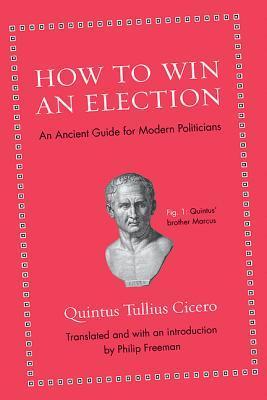What do you think?
Rate this book


A little-known classic in the spirit of Machiavelli's "Prince", "How to Win an Election" is required reading for politicians and everyone who enjoys watching them try to manipulate their way into office.
128 pages, Hardcover
First published January 1, 65
How to Win an Election by Quintus Tullius Cicero is a concise, yet timeless guide on political strategy, offering advice from the late Roman Republic that resonates deeply with modern political campaigns.
Written in 64 BCE as a letter from Quintus to his brother Marcus Tullius Cicero—who was running for consul, the highest office in the Roman Republic—the text reveals the complex blend of persuasion, manipulation, and public relations required to succeed in political contests. What makes this short treatise remarkable is not just its historical significance but its enduring relevance in contemporary politics.
The book is structured as a manual for aspiring politicians, filled with pragmatic, sometimes cynical advice that is as applicable to modern elections as it was in ancient Rome.
One of the core lessons in How to Win an Election is the importance of knowing and engaging with the electorate. Quintus emphasizes that winning over the masses requires the candidate to be personable, accessible, and capable of forming personal relationships with key groups. He insists that Marcus befriend important societal figures, from aristocrats to common voters, a tactic mirrored in modern politics where candidates spend substantial time courting endorsements from influential figures or key voter demographics.
For example, Quintus advises his brother to "remember names and use them often," which directly parallels modern-day retail politics, where candidates are encouraged to form personal connections with voters by remembering their names and stories. Politicians today, like U.S. President Bill Clinton or Alexandria Ocasio-Cortez, have been lauded for their ability to make voters feel personally recognized and valued—a key component of what Cicero’s letter suggests.
Quintus also highlights the importance of building a broad coalition of supporters, a strategy that can be seen in contemporary coalition-building efforts. Politicians like Barack Obama, who famously constructed a broad-based electoral coalition spanning different racial, socioeconomic, and generational groups, epitomize the ancient advice of uniting different factions to secure a decisive win.
A somewhat more Machiavellian element of Quintus’s advice is his endorsement of flattery and making promises—whether or not they can be kept. He urges his brother to offer hope and promises to voters, even if fulfilling them will be difficult. Quintus suggests that it is better to be well-liked and to create expectations, arguing that people forget about unfulfilled promises but will not forget a candidate’s charisma and charm.
This mirrors modern political campaigns where grandiose promises often fuel electoral success, even if they are difficult to deliver in practice. Quintus’s notion of making promises, whether realistic or not, echoes recent campaign tactics like Donald Trump’s "Build the Wall" pledge or Brexit advocates promising the return of sovereignty and wealth to the UK, ideas that resonated with the electorate but faced significant challenges in practical implementation.
Another strikingly modern aspect of Quintus’s advice is the focus on public image and handling public perception, something that dominates modern elections through the use of media. Quintus warns his brother to beware of scandal and gossip, urging him to maintain a respectable public persona while using charisma to win over the electorate. This echoes the heavy emphasis today on managing optics, with politicians carefully crafting their media appearances and public statements to avoid controversy or scandal.
A contemporary example is the strategic use of social media in political campaigns. Just as Quintus instructed Marcus to cultivate his public image in face-to-face interactions with the Roman public, modern politicians cultivate their image through Twitter, Instagram, and public relations campaigns.
Politicians like Barack Obama, Donald Trump, and Narendra Modi have used social media to directly engage voters, control narratives, and create personal connections, much like Quintus recommended for face-to-face interactions in ancient Rome.
Quintus repeatedly warns his brother of the dangers posed by political rivals and enemies. He advises Marcus to be cautious, always anticipating potential betrayals or attacks from opponents. This wariness is reminiscent of the modern political arena, where candidates must navigate a minefield of opposition attacks, smear campaigns, and rival strategies. In the 2016 U.S. presidential election, Hillary Clinton’s campaign had to constantly contend with attacks and opposition from multiple directions, including Russian interference and internal leaks. Quintus’s advice to stay vigilant and to anticipate the moves of rivals is timeless in its relevance.
How to Win an Election offers a candid and shrewd exploration of political strategy that remains strikingly relevant today. Quintus Tullius Cicero’s insights on coalition-building, voter engagement, promises, image management, and rivalry all reflect timeless truths about the nature of electoral politics. The book’s brevity adds to its charm, distilling wisdom into easily digestible portions that resonate with contemporary political challenges.
For anyone interested in politics—whether as a candidate, campaign strategist, or simply a student of history—this ancient Roman guide remains a must-read. Its ancient lessons on human nature, power, and persuasion offer a fascinating lens through which to view modern elections, proving that some aspects of political life have changed very little in over two millennia.